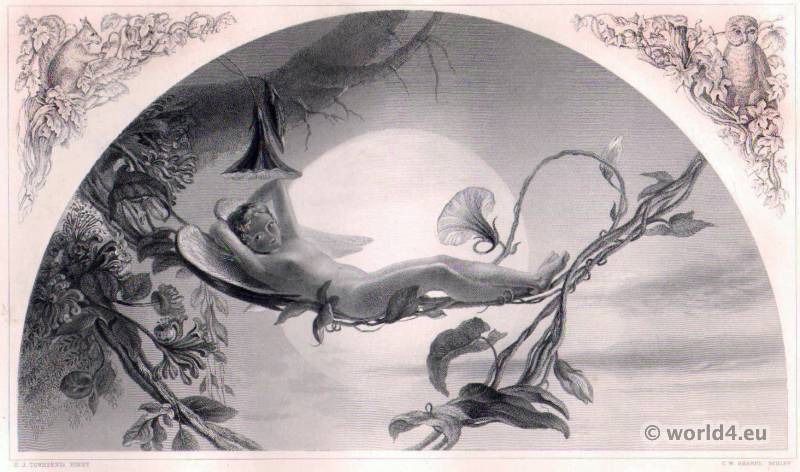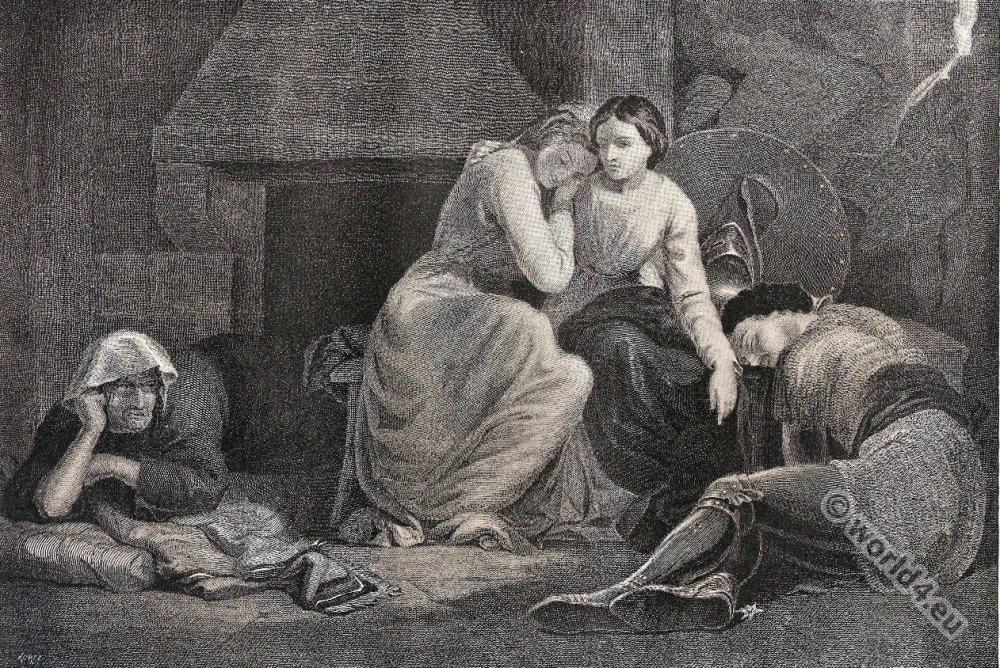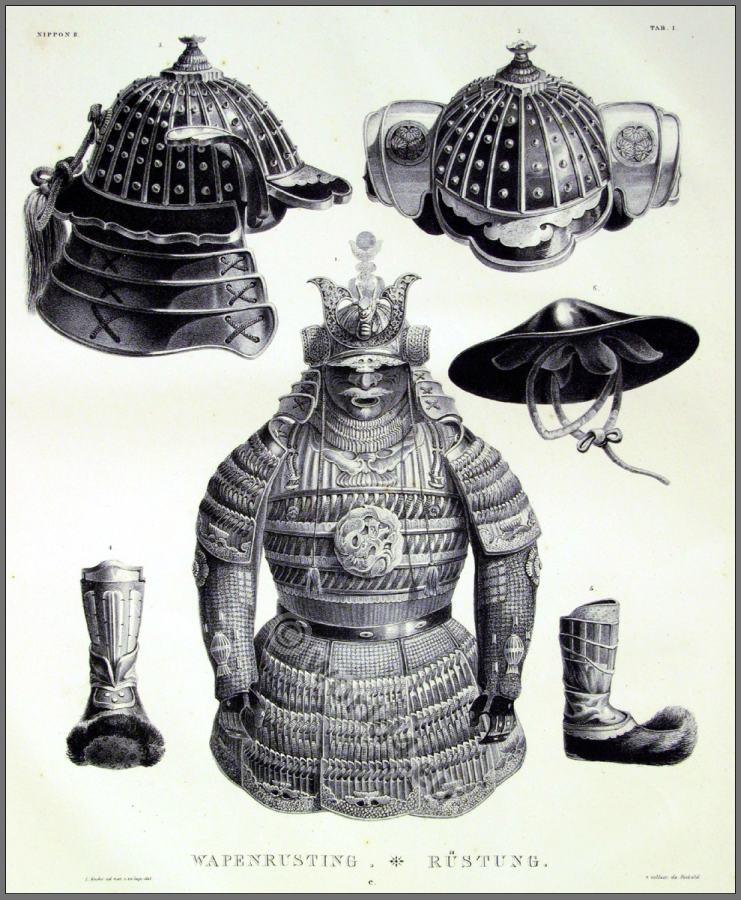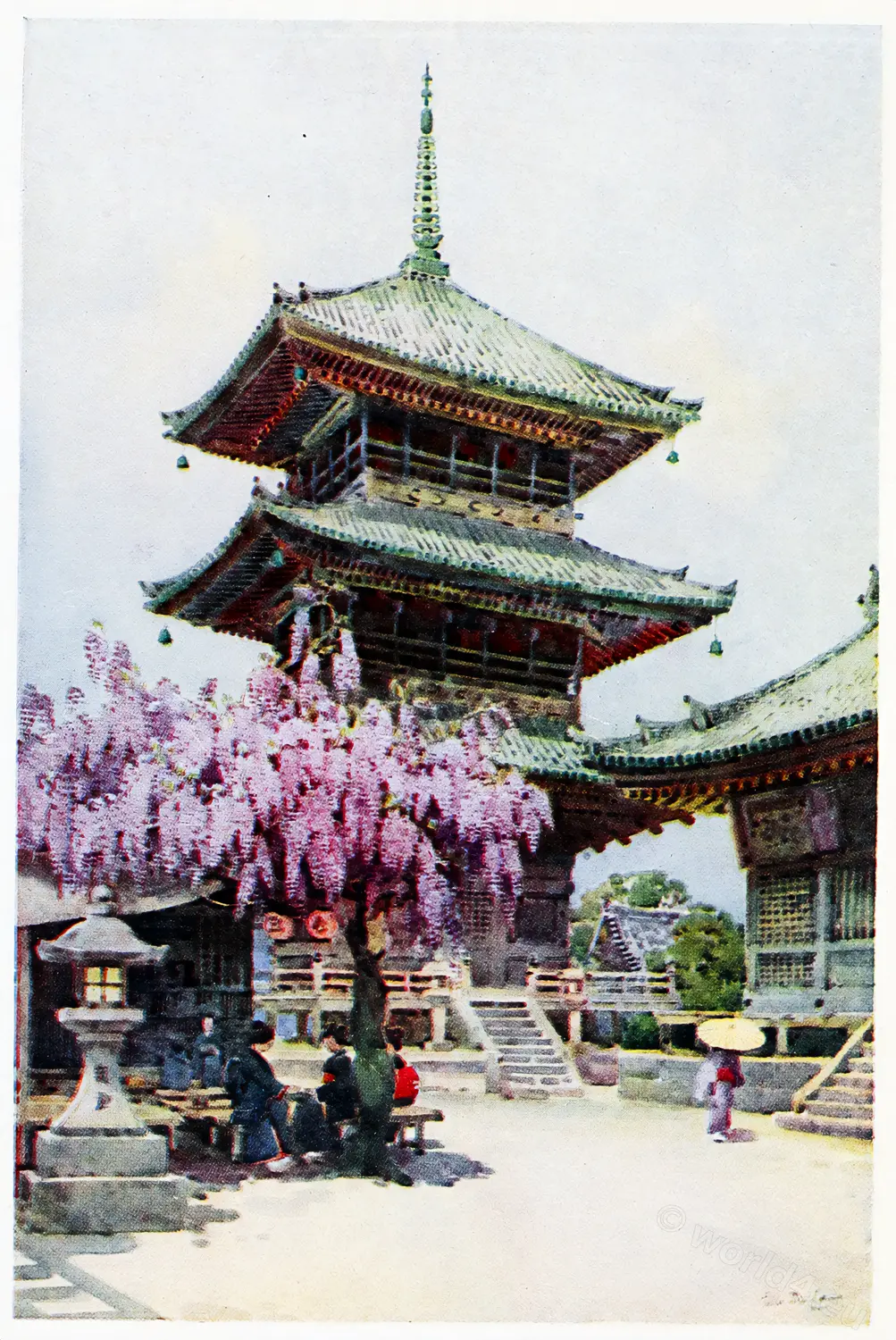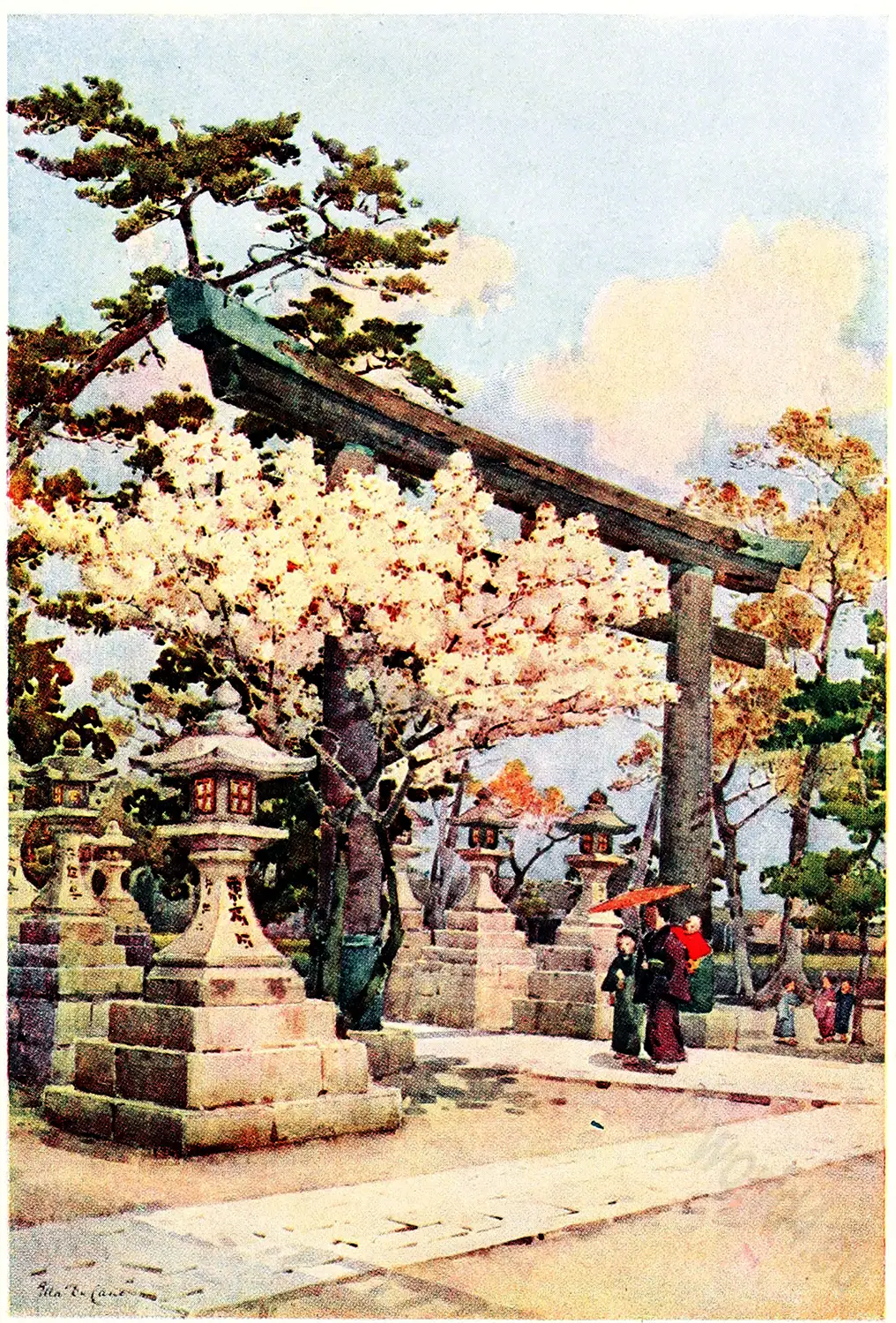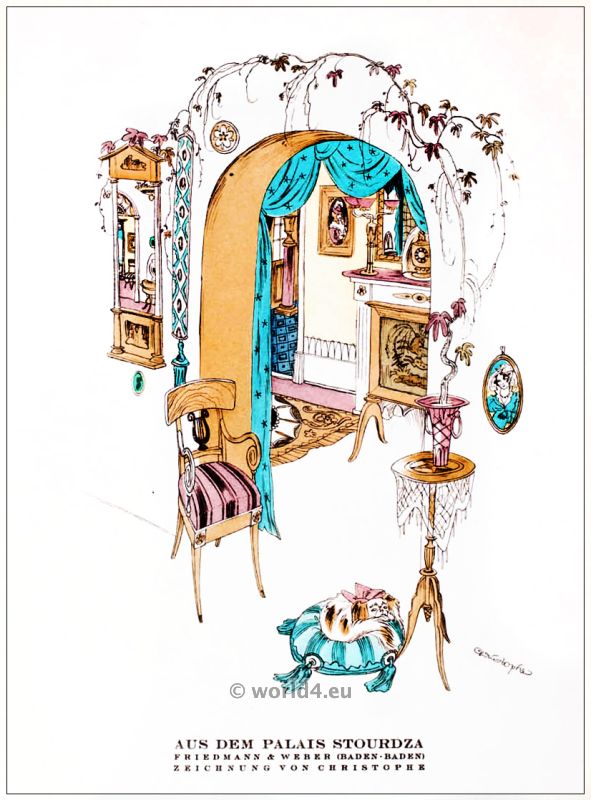The Fire-Fly’s Lovers
by William E. Griffis.
On the southern and sunny side of the castle moats of the Fukui castle, in Echizen, the water had long ago become shallow so that lotus lilies grew luxuriantly. Deep in the heart of one of the great flowers whose petals were as pink as the lining of a sea- shell, lived the King of the Fire-Flies, Hi-ō, whose only daughter was the lovely Princess Hotaru-himé. While still a child the Princess had been carefully kept at home within the pink petals of the lily, never going even to the edges except to see her father fly off on his journey. Dutifully she waited until of age, when the fire glowed in her own body, and shone, beautifully illuminating the lotus, until its light gleamed like a lamp within a globe of coral.
Every night her light grew brighter and brighter, until at last it was as mellow as gold. Then her father said: “My daughter is now of age, she may fly abroad with me sometimes, and when the proper suitor comes she may marry whom she will.”
So Hotaru-himé flew forth in and out among the lotus lilies of the moat, then into rich rice fields, and at last far off to the indigo meadows.
Wherever she went a crowd of suitors followed her, for she had the singular power of attracting all the night-flying insects to herself But she cared for none of their attentions, and though she spoke politely to them all she gave encouragement to none. Yet some of the sheeny-winged gallants called her a coquette.
One night she said to her mother, the Queen: “I have met many admirers, but I do not wish a husband from any of them. To-night I shall stay at home, and if any of them love me truly they will come and pay me court here. Then I shall lay an impossible duty on them. If they are wise they will not try to perform it but if they love their lives more than they love me, I do not want any of them. Who ever succeeds may have me for his bride.”
“As you will, my child,” said the Queenmother, who arrayed her daughter in her most resplendent robes, and set her on her throne in the heart of the lotus.
Then she gave orders to her body-guard to keep all suitors at a respectful distance lest some stupid gallant, a Horn-bug or a Cockchafer dazzled by the light, should approach too near and hurt the Princess or shake her throne.
No sooner had twilight faded away, than forth came the Golden Beetle, who stood on a stamen and making obeisance, said: —”I am Lord Green-Gold. I offer my house, my fortune, and my love to Princess Hotaru-himé.”
“Go and bring me fire and I will be your bride,” said Hotaru-himé.
With a bow of the head the beetle opened his wings and departed with a stately whirr. Next came a shining bug with wings and body as black as lamp-smoke, who solemnly professed his passion. He received the same answer: “Bring me fire, and you may have me for your wife.” Off flew the bug with a buzz. Pretty soon came the scarlet Dragon-fly, ex- pecting so to dazzle the Princess by his gorgeous colours that she would accept him at once. “I decline your offer,” said the Princess, “unless you bring me a flash of fire.” Swift was the flight of the Dragon-fly on his errand, and in came the Beetle with a tremendous buzz, and ardently pleaded his suit. “I will say ‘yes’ if you bring me fire,” said the glittering Princess.
Suitor after suitor appeared to woo the daughter of the King of the Fire-Flies until every petal was dotted with them. One after another in a long troop they appeared. Each in his own way, proudly, humbly, boldly, mildly, with flattery, with boasting, even with tears, proffered his love, told his rank or expatiated on his fortune or vowed his constancy, sang his tune or played his music. To every one of her lovers the Princess in modest voice returned the same answer: “Bring me fire, and I’ll be your bride.”
So without telling his rivals, each one thinking he had the secret alone sped away after fire.
But none ever came back to wed the Princess, Alas for the poor suitors! The Beetle whizzed off to a house near by through the paper windows of which light glimmered. So full washe of his passion that thinking nothing of wood or iron, he dashed his head against a nail, and fell dead on the ground.
The black bug flew into a room where a poor student was reading. His lamp was only a dish of earthenware full of rape seed oil with a wick made of pith. Knowing nothing of oil the lovelorn bug crawled into the dish to reach the flame and in a few seconds was drowned as in a sea.
“What’s that?” said a thrifty housewife, sitting with needle in hand, as her lamp flared up for a moment, smoking the chimney, and then cracking it; while picking out the scorched bits she found a roasted Dragon-Fly, whose scarlet wings were all burned off.
Mad with love the brilliant Hawk-Moth, afraid of the flame yet determined to win the fire for the Princess, hovered round and round the candle flame, coming nearer and nearer each time. “Now or never, the Princess or death,” he buzzed, as he darted forward to snatch a flash of flame, but singeing his wings, he fell helplessly down, and died in agony.
“What a fool he was, to be sure,” said the ugly Clothes-Moth, coming on the spot. “I’ll get the fire. I’ll crawl up inside the candle.” So he climbed up the hollow paper wick, and was nearly to the top, and close to the blue part of the flame, when the man, snuffing the wick, crushed him to death.
Sad indeed was the fate of the lovers of Hi-ō’s daughter. Some hovered around the beacons on the headland, some fluttered about the great wax candles which stood eight feet high in their brass sockets in the temples of Buddha; some burned their noses at the top of incense sticks, or were nearly choked by the smoke; some danced all night around the lanterns in the shrines; some sought the sepulchral lamps in the graveyards; one visited the cremation furnace; another the kitchen, where a feast was going on; another chased the sparks that flew out of the chimney; but none brought fire to the Princess, or won the lover’s prize. Many lost their feelers, had their shining bodies scorched or their wings singed, but most of them alas! lay dead, black and cold next morning.
As the priests trimmed the lamps in the shrines, and the servant maids the lanterns, each said alike: “The Princess Hotaru-himé must have had many lovers last night.”
Alas! alas! poor suitors. Some tried to snatch a streak of green fire from the cat’s eyes, and were snapped up for their pains. One attempted to get a mouthful of bird’s breath, but was swallowed alive. A Carrion-Beetle (the ugly lover) crawled off to the seashore, and found some fish scales that emitted light. The Stag-Beetle climbed a mountain, and in a rotten tree stump found some bits of glowing wood like fire, but the distance was so great that long be- fore they reached the castle moat it was daylight, and the fire had gone out; so they threw their fish scales and old wood away.
The next day was one of great mourning, and there were so many funerals going on that Hi-marō the Prince of the Fire-Flies on the north side of the castle moat inquired of his servants the cause. Then he learned for the first time of the glittering Princess.
Upon this the Prince, who had just succeeded his father upon the throne, fell in love with the Princess and resolved to marry her. He sent his chamberlain to ask of her father his daughter in marriage according to true etiquette. The father agreed to the Prince’s proposal, with the condition that the Prince should obey her behest in one thing, which was to come in person bringing her fire.
Then the Prince at the head of his glittering battalions came in person and filled the lotus palace with a flood of golden light. But Hotaru-himé was so beautiful that her charms paled not their fire even in the blaze of the Prince’s glory. The visit ended in wooing, and the wooing in wedding. On the night appointed, in a palanquin made of the white lotus-petals, amid the blazing torches of the Prince’s battalions of warriors, Hotaru-himé was borne to the Prince’s palace, and there Prince and Princess were joined in wedlock.
Many generations have passed since Hi-marō and Hotaru-himé were married, and still it is the whim of all Fire-Fly princesses that their base-born lovers must bring fire as their love-offering or lose their prize. Else would the glittering fair ones be wearied unto death by the importunity of their lovers. Great indeed is the loss, for in this quest of fire many thousand insects, attracted by the Fire-Fly, are burned to death in the vain hope of winning the fire that shall gain the cruel but beautiful one that fascinates them.
It is for this cause that each night insects hover around the lamp flame, and every morning a crowd of victims drowned in the oil, or scorched in the flame, must be cleaned from the lamp. This is the reason why young ladies catch and imprison the Fire-Flies to watch the war of insect-love, in the hope that they may have human lovers who will dare as much, through fire and flood, as they.
Source: The Fire-fly’s lovers, and other fairy tales of old Japan by William Elliot Griffis. New York: T. Y. Crowell & co., 1908.
Discover more from World4 Costume Culture History
Subscribe to get the latest posts sent to your email.




